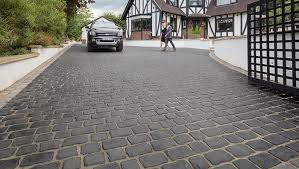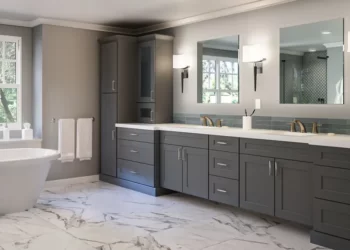In the ever-evolving world of home improvement, the term “sustainability” is no longer just a buzzword but a crucial consideration for homeowners. From energy-efficient appliances to eco-friendly building materials, the focus on environmentally conscious choices has become a driving force in the industry. One area where this shift towards sustainability is especially noticeable is in the design and construction of driveways. In this article, we’ll explore how natural driveways offer a harmonious fusion of sustainability and style for your home.
The Environmental Impact of Traditional Driveways
Before delving into the world of natural driveways, it’s essential to understand the environmental impact of traditional driveway options. Asphalt and concrete driveways have long been the go-to choices for homeowners due to their durability and cost-effectiveness. However, these materials have significant downsides when it comes to sustainability.
1. Runoff Pollution
Traditional driveways create a problem known as “runoff pollution.” Rainwater cannot penetrate the surface of asphalt or concrete, causing it to flow into the stormwater system. This runoff collects pollutants like oil, chemicals, and heavy metals from the driveway’s surface, ultimately finding its way into natural water bodies, harming the environment.
2. Heat Retention
Asphalt and concrete driveways also contribute to the “urban heat island” effect. These surfaces absorb and retain heat, making the area around your home hotter, especially in urban areas. This not only increases cooling costs but also negatively impacts the local climate.
3. Maintenance and Repairs
Traditional driveways require regular maintenance and may develop cracks over time, necessitating costly repairs. The materials used in these driveways are not as environmentally friendly, and the process of repair often involves additional resources and waste.

Natural Driveways: A Sustainable Solution
The need for more sustainable driveway options has led to the emergence of natural driveways as a preferred choice for environmentally conscious homeowners. These driveways are designed to be both eco-friendly and aesthetically pleasing. Let’s explore the key features of natural driveways.
1. Permeability
One of the primary advantages of natural driveways is their permeable nature. They allow rainwater to seep into the ground, reducing runoff pollution significantly. By choosing natural materials like gravel, grass pavers, or permeable pavers, you can mitigate the environmental impact of your driveway.
2. Heat Reflectivity
Natural driveways, with their use of lighter-colored materials, have higher reflectivity. This means they absorb less heat and contribute less to the urban heat island effect. Your home stays cooler, and you save on energy bills.
3. Low Maintenance
Natural driveways are often more low-maintenance than their traditional counterparts. For instance, gravel driveways are easy to maintain and require minimal repairs over time. This not only saves you money but also reduces the environmental footprint associated with driveway upkeep.
4. Aesthetic Appeal
Beyond their environmental benefits, natural driveways offer a unique and attractive look for your home. Whether you opt for a rustic gravel driveway or an elegant arrangement of permeable pavers, these options provide an aesthetic appeal that complements your landscaping.
Installing Your Natural Driveway
Now that you’re convinced of the merits of a natural driveway, let’s discuss how to go about installing one.
1. Choose Your Material
First, determine the type of natural driveway material that best suits your home and climate. Options include gravel, grass pavers, or permeable pavers. Each has its advantages, so consult with a local expert to make an informed choice.
2. Plan the Design
Consider the layout and design of your driveway. Work with a landscape architect to create a plan that seamlessly integrates your driveway into your home’s overall aesthetic.
3. Professional Installation
It’s essential to hire professionals for the installation of your natural driveway. Their expertise ensures that the project is executed efficiently and that the end result aligns with your vision.
4. Regular Maintenance
While natural driveways are low-maintenance, they do require some care. Ensure that you keep your driveway clean, free of debris, and address any issues promptly to extend its lifespan.
Conclusion
Natural driveways are a testament to the synergy of sustainability and style in modern home design. By choosing eco-friendly materials and designs that allow for rainwater absorption and heat reflectivity, you not only reduce your environmental footprint but also enhance the curb appeal of your home. It’s a win-win situation for homeowners who are conscious of both aesthetics and environmental impact. When it comes to driveways, the choice is clear: go natural, and you’ll be leaving a positive mark on your home and the environment.
In a world where every decision counts, natural driveways stand out as a practical way to make a difference. They are the future of stylish, sustainable home design.








Comments 2